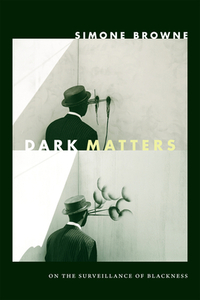Take a photo of a barcode or cover
challenging
dark
hopeful
informative
reflective
slow-paced
informative
reflective
medium-paced
absolutely crucial contextualization of contemporary thought around surveillance that very clearly and convincingly argues that anti-Black surveillance and Black resistance to that surveillance are foundational to the many apparatuses of state / corporate surveillance we see today. fantastic interdisciplinary lens, great grounding in its essential terms, just all around impactful scholarship.
An academic look at the surveillance of blackness. I read this concurrently with Caste by Isabel Wilkerson and the two books definitely complemented one another.
Wow. Damn. Yes. Wish I had read this about five years ago, but no time like the present. Really learned a lot and loved Browne's cogent argumentation.
Phew, this took me a while to get through. You'll want to spend some time in reflection after reading a section or two.
Privacy has become a privilege given solely to the rich and "normal." Browne offers a convincing case that this is how it has always been ever since the Land of the Free was first discovered. The poor and "out-of-place" must be catalogued, watched, and tracked. From the chattel slavery of the past, to the non-whites of today. And due to 9/11, any acts challenging this surveillance only further indicts you as a potential suspect.
The biggest takeaway is to consider, as she quotes Desi Cryer, what changes when her "blackness enters the frame." Who is visible/invisible? Subject/Viewer? Who may opt-in/opt-out? And so forth.
Even if you're already keen to ask such questions, this is still worth the read to get an in-depth look at the roots of this anti-black surveillance. It may be a bit dense, but Browne makes sure to clearly define the terms (Unvisible & sousveillance, for example), and the case stories are fascinating and well-researched.
Privacy has become a privilege given solely to the rich and "normal." Browne offers a convincing case that this is how it has always been ever since the Land of the Free was first discovered. The poor and "out-of-place" must be catalogued, watched, and tracked. From the chattel slavery of the past, to the non-whites of today. And due to 9/11, any acts challenging this surveillance only further indicts you as a potential suspect.
The biggest takeaway is to consider, as she quotes Desi Cryer, what changes when her "blackness enters the frame." Who is visible/invisible? Subject/Viewer? Who may opt-in/opt-out? And so forth.
Even if you're already keen to ask such questions, this is still worth the read to get an in-depth look at the roots of this anti-black surveillance. It may be a bit dense, but Browne makes sure to clearly define the terms (Unvisible & sousveillance, for example), and the case stories are fascinating and well-researched.
challenging
informative
slow-paced
reflective
sad
fast-paced
chock full of new information framed in ways i've never thought of before, amazing read
challenging
informative
fast-paced
challenging
medium-paced
I wish the people that created the Netflix Documentary The Social Dilemma had read this book, I believe it would have provided a great deal of context around surveillance. Through the context of reading about race, I've learned a lot about American history that I regret not knowing earlier in my life. This is one of those books that does multiple things at once. First, it teaches about Black history in general, not just Black people in America, but in Africa as well. Second, it teaches about the history of prisons and the very first prison the Panopticon. Third, it discusses Surveillance and surveillance technologies.
It doesn't teach these as separate threads, though. It's impossible to teach these topics separately. Even when reading White Rage: The Unspoken Truth of Our Racial Divide, small parts of these topics were brought up. In Between the World and Me, these same ideas were brought up, just a shorter time horizon for the history.
The United States created law after law, mechanism after mechanism, to surveil Black people. According to Browne, this as soon as an African was captured, they'd be branded, sorted, and documented. Then they'd be surveiled in the slave ship, which was a truly horrific environment.
There was something about how Browne described the slave ship that hit home a lot harder than when I'd seen the ships before. Maybe it's the Pandemic, maybe it's my own allergies, maybe it's understanding that they were locked in this miserable condition for 67 days!
Speaking of the pandemic, the right-wing out bursts against wearing masks is laughable considering some of the laws we implemented in the past to protect white people from Black people. There were laws in New York City, called Lantern Laws where any Black person had to have a lantern lit at anytime after dark. They weren't allowed to be in groups larger than three people and had to have a candle lit at all times. If they didn't, they could get 40 lashings (apparently it was reduced later to 15). 40 Lashings could certainly kill someone.
Ultimately, the book moves from the history of surveillance to present day, which draws a pretty straight line to what we experience now at the airport after 9/11. However, in the airport Black and brown people experience significantly more surveillance than white people. This can lead to ridiculous things like having an afro searched for bomb materials and statistically higher search rates for Black Woman than white women even though statistically white women are more likely to have contraband. Further, this extends to accepting Black people as citizens, as given in an example with a Canadian woman.
I believe this book is critical in understanding our Government's response to the BLM movement, the obsessions with Antifa, avoidance of investigating right-wing terrorism, and our current surveillance state. I think anyone that's working in the social media space or adtech space, should read this book. If you care about ethical technology, you need to read this book. Because if we understand this and address the problems outlined in this book, we address surveillance issues for everyone.
It doesn't teach these as separate threads, though. It's impossible to teach these topics separately. Even when reading White Rage: The Unspoken Truth of Our Racial Divide, small parts of these topics were brought up. In Between the World and Me, these same ideas were brought up, just a shorter time horizon for the history.
The United States created law after law, mechanism after mechanism, to surveil Black people. According to Browne, this as soon as an African was captured, they'd be branded, sorted, and documented. Then they'd be surveiled in the slave ship, which was a truly horrific environment.
There was something about how Browne described the slave ship that hit home a lot harder than when I'd seen the ships before. Maybe it's the Pandemic, maybe it's my own allergies, maybe it's understanding that they were locked in this miserable condition for 67 days!
Speaking of the pandemic, the right-wing out bursts against wearing masks is laughable considering some of the laws we implemented in the past to protect white people from Black people. There were laws in New York City, called Lantern Laws where any Black person had to have a lantern lit at anytime after dark. They weren't allowed to be in groups larger than three people and had to have a candle lit at all times. If they didn't, they could get 40 lashings (apparently it was reduced later to 15). 40 Lashings could certainly kill someone.
Ultimately, the book moves from the history of surveillance to present day, which draws a pretty straight line to what we experience now at the airport after 9/11. However, in the airport Black and brown people experience significantly more surveillance than white people. This can lead to ridiculous things like having an afro searched for bomb materials and statistically higher search rates for Black Woman than white women even though statistically white women are more likely to have contraband. Further, this extends to accepting Black people as citizens, as given in an example with a Canadian woman.
I believe this book is critical in understanding our Government's response to the BLM movement, the obsessions with Antifa, avoidance of investigating right-wing terrorism, and our current surveillance state. I think anyone that's working in the social media space or adtech space, should read this book. If you care about ethical technology, you need to read this book. Because if we understand this and address the problems outlined in this book, we address surveillance issues for everyone.




